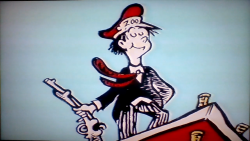Difference between revisions of "Portal:What Government do We Want"
m |
(embedded image) |
||
| Line 4: | Line 4: | ||
<table width="100%" border="0" style="border-bottom:1px solid #000080;" cellpadding="0"> | <table width="100%" border="0" style="border-bottom:1px solid #000080;" cellpadding="0"> | ||
<tr><td style="padding:5px;"> | <tr><td style="padding:5px;"> | ||
| + | [[File:If I Ran the Zoo.png|250px|thumb|"<big>'''If I ran the zoo.'''</big><br>I'd make a few changes.<br>That's just what I'd do.<br>from ''If I Ran the Zoo'' by Dr. Seuss|link=]] | ||
In America's early days we were an independent lot. We believed in liberty, a right to property, and freedom from arbitrary arrest. We saw the need for government but the problem was how to use it to maintain order without destroying liberty or trampling on our 'inalienable' rights. This balance was the subject of public debate leading up to the ratification of our constitution, articulated in essays that come down to us as The Federalist Papers and The Anti-Federalist Papers. It amounted to one side saying that the existing confederation of independent states provided as much government as could exist and be compatible with liberty; and the federalists saying that the Confederation was insufficient to maintain order and provide for a nation strong enough to defend itself against external (and internal) attacks on that liberty. Both sides agreed with Thomas Paine who wrote "government even in its best state is but a necessary evil in its worst state, an intolerable one." (''Common Sense'' 1776). | In America's early days we were an independent lot. We believed in liberty, a right to property, and freedom from arbitrary arrest. We saw the need for government but the problem was how to use it to maintain order without destroying liberty or trampling on our 'inalienable' rights. This balance was the subject of public debate leading up to the ratification of our constitution, articulated in essays that come down to us as The Federalist Papers and The Anti-Federalist Papers. It amounted to one side saying that the existing confederation of independent states provided as much government as could exist and be compatible with liberty; and the federalists saying that the Confederation was insufficient to maintain order and provide for a nation strong enough to defend itself against external (and internal) attacks on that liberty. Both sides agreed with Thomas Paine who wrote "government even in its best state is but a necessary evil in its worst state, an intolerable one." (''Common Sense'' 1776). | ||
<br>We'll call this view of government 'classic liberal'. | <br>We'll call this view of government 'classic liberal'. | ||
| Line 17: | Line 18: | ||
<references /> | <references /> | ||
</td> | </td> | ||
| − | + | </tr> | |
| − | |||
| − | |||
| − | |||
</table> | </table> | ||
<!--</div>--> | <!--</div>--> | ||
Revision as of 15:55, 31 August 2015
How should we be governed?
|
In America's early days we were an independent lot. We believed in liberty, a right to property, and freedom from arbitrary arrest. We saw the need for government but the problem was how to use it to maintain order without destroying liberty or trampling on our 'inalienable' rights. This balance was the subject of public debate leading up to the ratification of our constitution, articulated in essays that come down to us as The Federalist Papers and The Anti-Federalist Papers. It amounted to one side saying that the existing confederation of independent states provided as much government as could exist and be compatible with liberty; and the federalists saying that the Confederation was insufficient to maintain order and provide for a nation strong enough to defend itself against external (and internal) attacks on that liberty. Both sides agreed with Thomas Paine who wrote "government even in its best state is but a necessary evil in its worst state, an intolerable one." (Common Sense 1776).
In the early 20th century there was a shift toward the 'progressive' view that saw government not as necessary evil, but as a force for good--correcting social flaws that the minimalist approach ignored. This view holds that individual rights are not 'inalienable', but are created by government; and that a benevolent and powerful state can eliminate the economic imbalances created by our rapid industrialization and advance of technology. The constitution's limits on government power were seen as barriers to a modern state to be overcome by greater power to be exercised by impartial administrative agencies that receive power from the legislature and that major issues should be settled through the action of a democratically elected legislature unfettered by the Constitution's structure, protection of property, and judicial review. Which do we want?
|
Categories and contentsClick on arrows to see subcategories and articles. Things you can do
|
Featured ArticleBig Government
|
